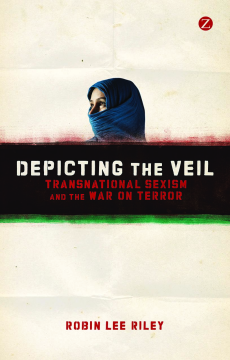
Additional Information
Book Details
Abstract
This powerful book exposes how gendered Orientalism is wielded to justify Western imperialism.
Over the last ten years, Western governments and mainstream media have utilized concepts of white masculine supremacy and feminine helplessness, juxtaposed with Orientalist images depicting women of color as mysterious, sinister, and dangerous, to support war. Oscillating between Mrs Anthrax, female suicide bomber and tragic, helpless victim, representations of 'brown women' have spawned both rescue narratives and terrorist alerts.
Examining media and pop culture from Sex and the City 2 to Vanity Fair and Time magazine, Robin Riley uses transnational feminist analysis to reveal how this kind of transnational sexism towards Muslim women in general and Afghan and Iraqi women in particular has led to a new form of gender imperialism.
'Riley frames her analysis of the ways Western media depict the "veil" around the valuable concept of transnational sexism, which diffuses into American politics and popular culture racist and sexist stereotypes about Muslim women. This unquestioned "knowledge" has helped to sustain support for brutal US imperialist wars in Afghanistan and Iraq.' Eric Hooglund, editor of Middle East Critique
'Robin Riley is going to make a lot of us uncomfortable. That's the good news! Her careful investigation of the myriad ways in which US media have constructed diverse Iraqi and Afghan women reveals how we ourselves, especially readers and viewers in North America, can become complicit in transnational sexism.'
Cynthia Enloe, author of Nimo's War, Emma's War: Making Feminist Sense of the Iraq War
'Robin Riley dissects the transnational sexism that structures transnational Orientalism with its global militarism. In this process she unveils the Western mind and exposes the possibility of a de-racialized future for women in Afghanistan and Iraq. This is an important read for anyone who seeks to inhibit the use of misogyny for imperial purposes and wishes to keep the next US war from happening.'
Zillah Eisenstein, Distinguished Scholar in Residence, Ithaca College
Robin Lee Riley is an assistant professor in the Women's and Gender Studies Department, Syracuse University.
Table of Contents
| Section Title | Page | Action | Price |
|---|---|---|---|
| About the author | i | ||
| Title | iii | ||
| Copyright | iv | ||
| Contents | v | ||
| Acknowledgments | vi | ||
| Introduction | 1 | ||
| The study | 4 | ||
| Propaganda | 7 | ||
| Learning war | 9 | ||
| Reading the news | 12 | ||
| Transnational sexism | 13 | ||
| Depicting the veil | 15 | ||
| 1 Rescuing Afghan women | 17 | ||
| Thank you for the rescue | 18 | ||
| Victims or villains? | 21 | ||
| Burqa, hijab, chador, niqab: veiling Orientalism | 24 | ||
| Orientalizing Afghan masculinity | 32 | ||
| ‘Strange sex’ and ‘dancing boys’ | 34 | ||
| Elections, immolation, safe(r) spaces | 37 | ||
| 2 ‘Real housewives’: married to the enemy | 43 | ||
| Married to bin Laden | 44 | ||
| Another kind of rescue tale | 50 | ||
| All in the family | 52 | ||
| Dr Germ and Mrs Anthrax | 60 | ||
| More dangerous women: suicide bombers | 66 | ||
| ‘Survival sex’ | 71 | ||
| Enjoy your freedom. Goodbye | 74 | ||
| 3 ‘Where are the women?’ Muslim women’s visibility and invisibility | 76 | ||
| Bibi Aisha, Bibi Ayesha, Aesha Mohammadzai, or the Afghan girl without a nose | 78 | ||
| Visibility = liberation? | 88 | ||
| Aafia Siddiqui | 91 | ||
| Transnational visibility | 105 | ||
| Here’s the dilemma | 110 | ||
| 4 We are all soldiers now: deploying Western women | 112 | ||
| Female engagement teams | 122 | ||
| This is what ‘liberation’ looks like | 127 | ||
| The enemy is us | 132 | ||
| Doing the empire’s work on page and screen | 135 | ||
| No sex in the desert | 138 | ||
| Another blond hero | 140 | ||
| 5 This is what liberation looks like | 143 | ||
| Leaving Afghanistan and Iraq | 144 | ||
| Question to Western media: Are we at war? | 145 | ||
| Hugh Hefner as liberator | 147 | ||
| Where do we go from here? | 148 | ||
| Notes | 151 | ||
| Bibliography | 157 | ||
| Index | 176 | ||
| About Zed Books | 184 |
